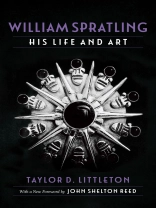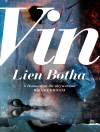In this lavishly illustrated biography of silversmith and graphic artist William Spratling (1900–1967), Taylor D. Littleton reintroduces one of the most fascinating American expatriates of the early twentieth century. Best known for his revolutionary silver designs, Spratling influenced an entire generation of Mexican and American silversmiths and transformed the tiny village of Taxco into the ‘Florence of Mexico.’ Littleton widens the context of Spratling’s popular reputation by examining the formative periods in his life and art that preceded his brilliant entrepreneurial experiment in the Las Delicias workshop in Taxco, which left a permanent mark on Mexico’s artistic orientation and economic life.
Spratling made a fortune manufacturing and designing silver, but his true life’s work was to conserve, redeem, and interpret the ancient culture of his adopted country. He explained for North American audiences the paintings of Mexico’s modern masters and earned distinction as a learned and early collector of pre-Columbian art. Spratling and his workshop gradually became a visible and culturally attractive link between a steady stream of notable American visitors and the country they wanted to see and experience.
Spratling had the rare good fortune to witness his own reputation — as one of the most admired Americans in Mexico — assume legendary status before his death. William Spratling, His Life and Art vividly reconstructs this richly diverse life whose unique aesthetic legacy is but a part of its larger cultural achievement of profoundly influencing Americans’ attitudes toward a civilization different from their own.
In this lavishly illustrated biography of silversmith and graphic artist William Spratling (1900–1967), Taylor D. Littleton reintroduces one of the most fascinating American expatriates of the early twentieth century. Best known for his revolutionary silver designs, Spratling influenced an entire generation of Mexican and American silversmiths and transformed the tiny village of Taxco into the ‘Florence of Mexico.’ Littleton widens the context of Spratling’s popular reputation by examining the formative periods in his life and art that preceded his brilliant entrepreneurial experiment in the Las Delicias workshop in Taxco, which left a permanent mark on Mexico’s artistic orientation and economic life.
Spratling made a fortune manufacturing and designing silver, but his true life’s work was to conserve, redeem, and interpret the ancient culture of his adopted country. He explained for North American audiences the paintings of Mexico’s modern masters and earned distinction as a learned and early collector of pre-Columbian art. Spratling and his workshop gradually became a visible and culturally attractive link between a steady stream of notable American visitors and the country they wanted to see and experience.
Spratling had the rare good fortune to witness his own reputation — as one of the most admired Americans in Mexico — assume legendary status before his death. William Spratling, His Life and Art vividly reconstructs this richly diverse life whose unique aesthetic legacy is but a part of its larger cultural achievement of profoundly influencing Americans’ attitudes toward a civilization different from their own.
Over de auteur
Taylor D. Littleton is W. Kelly Mosley Professor of Science and Humanities Emeritus at Auburn University.












